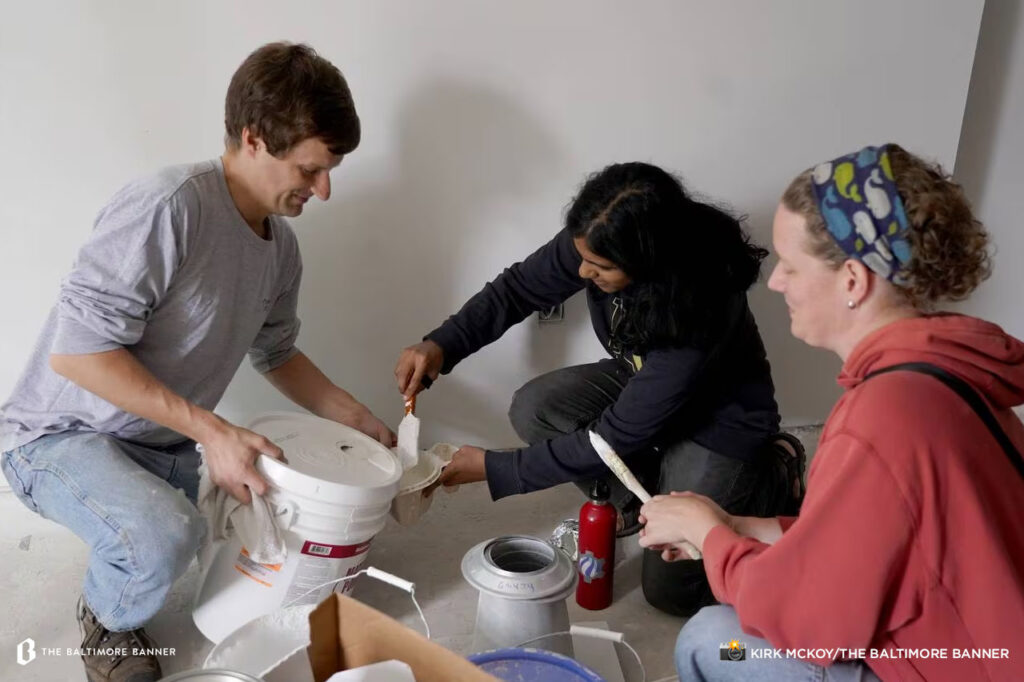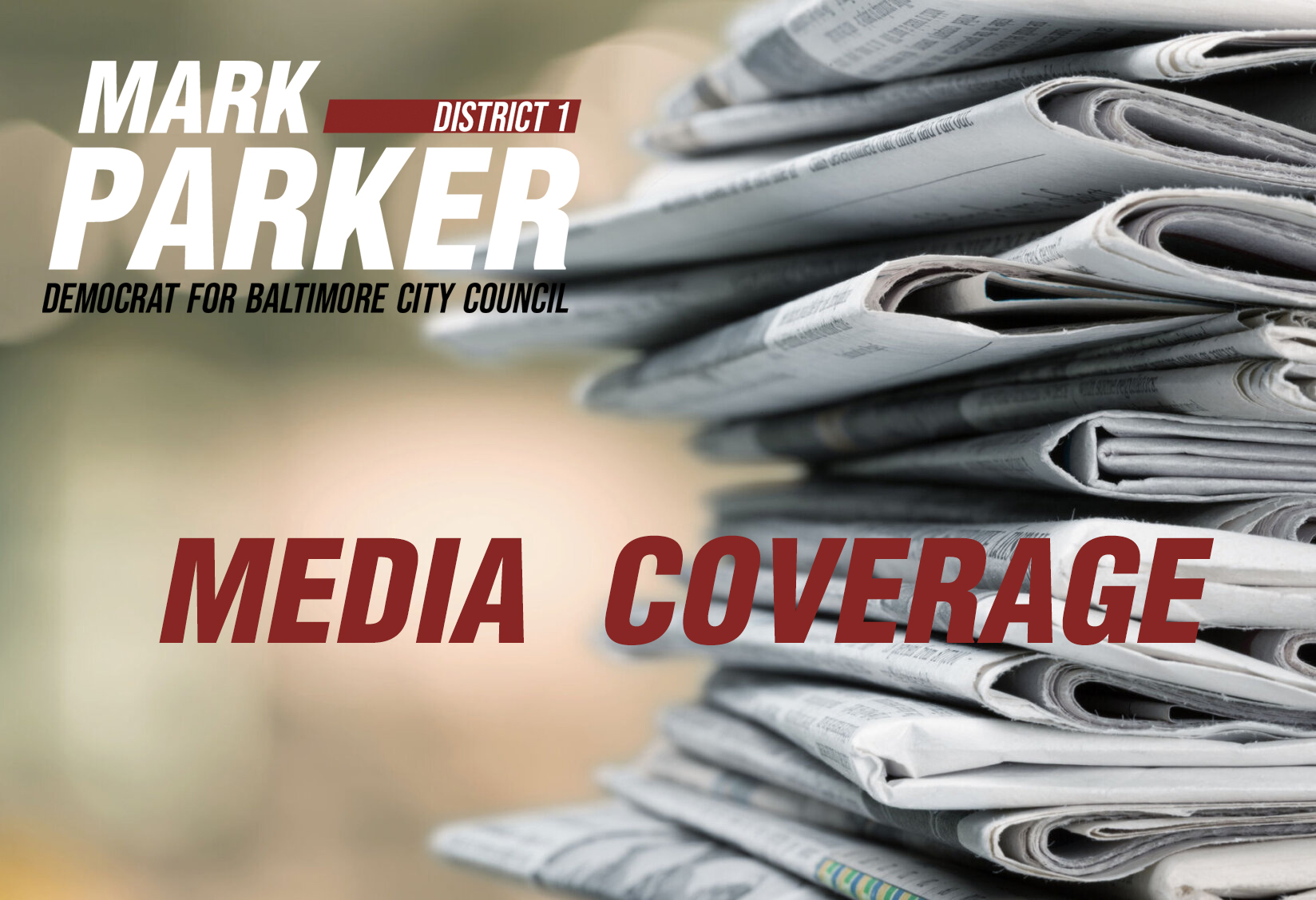By: Alissa Zhu

For more than a year, the fire-damaged shell of a home sat mostly untouched, a few blocks east of Patterson Park. Water poured in through a hole in the roof when it rained, mold bloomed on the soot-darkened walls and rats settled in behind boarded-up windows and doors.
Now, members of a church next door are bringing life back into the two-story rowhome. In the spring, a small army of volunteers tore up damaged floors and walls. Construction crews have re-roofed the building and replaced the interior entirely. Volunteers painted the walls this past weekend. The house is nearly ready to become a home to newly-arrived refugees. An initial family hasn’t been selected yet.
The Taliban takeover of Afghanistan last year prompted a mass evacuation of more than 120,000 Afghans, including some 2,000 who have come to Maryland since, according to the Maryland Office for Refugees and Asylees’ data as of June. More than 480 Afghans have resettled in Baltimore, which has long been a hub for displaced individuals. Over the last two decades, more than 15,000 refugees have called Baltimore home, according to the International Rescue Committee, one of the major resettlement agencies that operates in the area.
The rowhome is part of the Clinton Street Community Center, a nonprofit formed by Breath of God Lutheran Church. Pastor Mark Parker said their mission was to create affordable housing for at least one refugee family in Highlandtown. The idea is not only to provide a family with a place to live, but also to surround them with friendly, knowledgeable neighbors who can provide support through the confusing and complicated transition that all refugees face in a new country. Church and community members can help a newly-arrived family navigate the public school system, find jobs and access childcare, Parker said.
If the church had not purchased the property, it would have likely been snatched up by investors and flipped for a profit, like so many other vacant buildings across the city, Parker said.
“When we can do something else that is unique and contributes to our community and meets the needs of some of our most vulnerable neighbors, it’s not just good for our neighbors,” Parker said. “We’re a stronger and better community when we can create space for and help to support people of all kinds of backgrounds and can live and become community together, side by side.”
In November 2020, a blaze consumed three houses on Clinton Street near the church, which sustained minor damage. After the smoke cleared and two families who had been living next door moved away, the structures continued to sit, singed and vacant. One building was renovated by the homeowner and eventually sold. The church purchased the other two with the help of a loan, donations and state funding through a local bond initiative, Parker said. One is now part of the recently expanded Highlandtown Preschool, which operates in an area of the city with few regulated and affordable child care options.
Sarah Kretschmann — a member of Breath of God Lutheran Church and a communications team member of Lutheran Immigration and Refugee Service, a resettlement agency — serves on the board of the Clinton Street Community Center.
Refugees face “a long journey of settling in” as they get their footing and build a new life in an unfamiliar place, Kretschmann said.
When refugees first arrive in a new country, a resettlement agency helps them enroll for public benefits, such as food stamps, cash assistance and medical assistance. They get caseworkers and receive help in finding housing and employment, and with learning English. Although resettlement agencies provide a base level of support, many refugees lack social networks they can rely on for help.
That’s why “having a connection to the community who can advocate on behalf of folks not getting the welcome or chance they deserve is so important,” Kretschmann said.
The model of community-supported resettlement is practiced by other organizations that sponsor refugee families. Chizuk Amuno Congregation in Pikesville formed “welcome circles” for two families who fled Afghanistan in the last year, according to synagogue member and volunteer Ilana Jackson.
Welcome circle members greeted the refugee families after their planes touched down at Baltimore-Washington International Thurgood Marshall Airport, Jackson said. From there, they were involved in nearly every part of the families’ resettlement, taking them shopping for groceries and clothes, providing transportation to medical appointments and helping them get driver’s licenses. A family hosted volunteers for a dinner of traditional Afghan food, Jackson said, and her kids play with their children.
“Because it’s volunteer-driven, it’s driven by people who really care,” Jackson said. “You get this personalized, warm approach you might not get in other settings.”
With renovations nearly complete at the Highlandtown home, Parker hopes a refugee family can move in early next year. The church plans to partner with Lutheran Social Services of the National Capital Area for resettlement services and to form and train a team of volunteers. The Clinton Street Community Center will support the family for a year or two until they’re ready to stand on their own. At that point, they’ll move out and the cycle will begin again.
As Southeast Baltimore “has always been a place where migrants from all over the world have come and found and built good, solid communities, have raised their families, have started businesses,” Parker said, the rowhome’s new mission seems only fitting.

